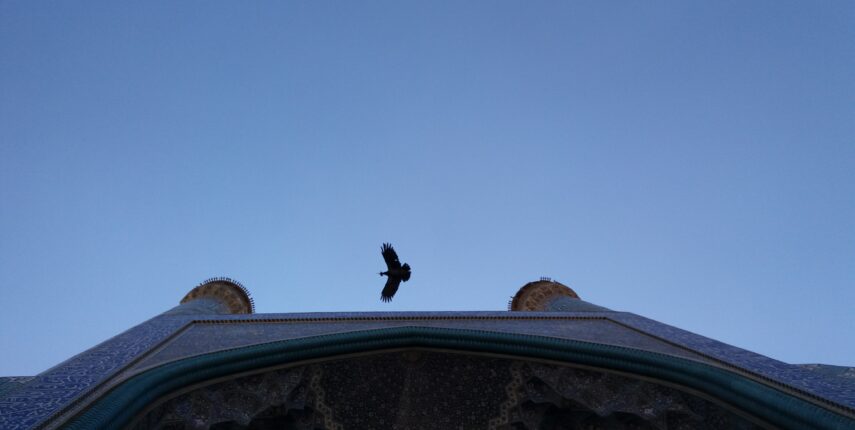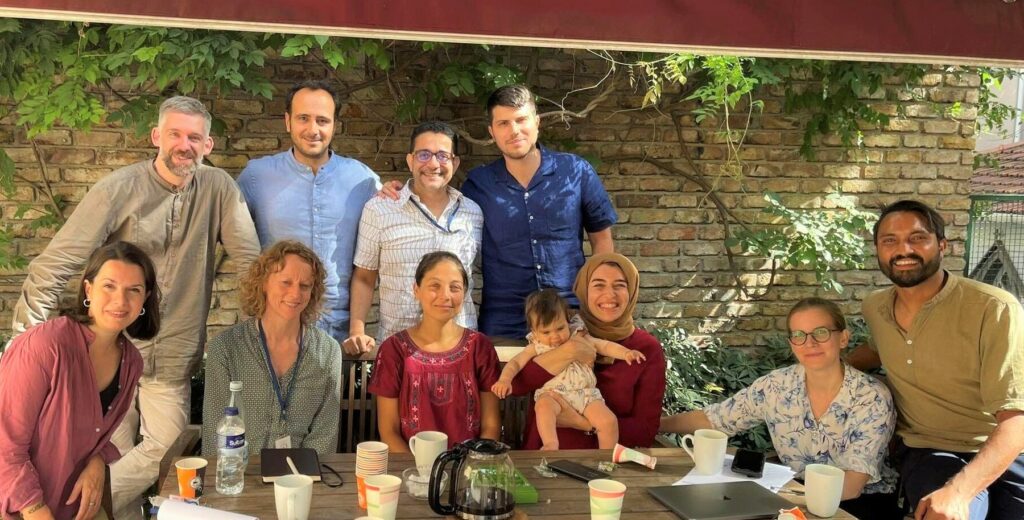
A report on the 1ST EASA Muslim Worlds Network workshop at the Swedish Research Institute, Istanbul, 7-8 September 2023 | by Lili Di Puppo, Fabio Vicini, and Stefan Williamson Fa
How do anthropologists approach experiences of transcendence in Muslim communities? In what ways can Muslim ontologies be taken more seriously in anthropological accounts? What potential do our own momentary encounters with transcendence as anthropologists have in addressing anthropological research on Islam and other religious traditions more broadly? With these questions in mind, we inaugurated the 1st European Association of Social Anthropologists (EASA) Muslim Worlds Network workshop “Rethinking anthropology in light of ‘Muslim Worlds’” at the Swedish Research Institute in Istanbul on 7-8 September 2023. Departing from the long-held anthropological approach in which experiences of transcendence have been studied from the perspective of belief, we invited the workshop participants to reflect instead on the forms of knowledge disclosed by their encounters with transcendence, God, and non-immediately-perceptible realities in the field.
The conversation thus centred on Muslim modes of knowing and how they reveal limits but also potentialities by challenging prevalent theoretical and methodological approaches in anthropology. Participants were invited to reflect upon their own experiences of being potentially unsettled, puzzled, confused, and also inspired by the modes of knowing they have encountered during their research. By emphasizing the anthropologist’s own experience of encountering transcendence and the divine we aimed to go beyond an indirect mode of studying transcendence that focuses on the beliefs and practices of religious interlocutors.
Reflecting on their field encounters with transcendence, many workshop participants noted its elusiveness and ephemerality, providing only momentary glimpses into other experiences of reality. Ashraf Hoque referred to this elusiveness with an ethnographic story of his family friend, and avid fisher, Ahmet’s many failed attempts to capture a pike fish in a family pond in Sylhet, Bangladesh. After many years of unsuccessful attempts, Ahmet unexpectedly captured the fish on the very day of a commemorative feast hosted for Hoque’s mother who had recently passed away in the UK. All mourners attending the gathering agreed that the timing of the fish’s capture was a miracle in honor of his mother and that the fish radiated nur, the divine light, its plenitude coming from the invisible, al-ghayb. The fish that nourished the mourners was perceived as a miracle; a miracle inscribed in the daily life of a Bangladeshi village.
The miraculous fish provides a vivid illustration of the ephemerality and unexpectedness of experiences of transcendence, demonstrating how easily such experiences escape the researcher’s control.
The miraculous fish provides a vivid illustration of the ephemerality and unexpectedness of experiences of transcendence, demonstrating how easily such experiences escape the researcher’s control. A second question that emerged from this ethnographic story was whether such experiences could be “transported” from one environment to another, e.g., from a Bangladeshi field to the secular environment of the academy in which the anthropologist engages in a work of analysis. As Joud Alkorani asked, “What gets lost in the space between the field and the work of analyzing and writing?”
Prompted by this question, participants explored ways to bring experiences of transcendence from the field to the “desk” and thus bridge the potential gap between these environments by considering three aspects of anthropological work: 1) language and writing, 2) theorizing, and 3) the influence of the environment and the networks in which the anthropologist is embedded. These themes are connected with the different worlds that the anthropologist inhabits, each of them having different understandings of and approaches to knowledge. As noted by Alkorani, for instance, while the anthropologist must comply with the expectation of formulating a clear argument and exposing it confidently within the secular academia, s/he often experiences what can be called “holes” and gaps in understanding which are related to moments of uncertainty experienced in the field. And yet, Alkorani remarked, an anthropologist would not end an academic text with the words Allahu ‘alam, “Allah knows best,” a phrase commonly used to emphasize the limits of human knowledge in the Islamic scholarly tradition, as this would undermine the confident posture that is demanded of her.
Language, writing, theorizing
Coming back to the story of the miraculous fish, the question that the anthropologist faces in his writing is whether wonders and miracles that apparently defy logic can find their place in an academic text. This question recalls how mystics and scholars have wrestled over the centuries with the impossibility of communicating knowledge of the divine, as seen in the development of apophatic, or negative, theology. Stimulated by these reflections, workshop participants explored other possibilities of conveying their fieldwork experiences by pondering upon modes of expression beyond the academic text such as poetry, sounds, images, and also the language of dreams, such as those found in Annika Schmeding’s ethnography of Sufis in Afghanistan and Maria Louw’s record of elderly women’s encounters with ancestor spirits in Kyrgyzstan.
In her presentation, Louw pointed out how images rather than concepts can help us retain a sense of wonder and uncertainty. An image captures more adequately the blurry edges of human experience, for example: how messages from the otherworld put elderly Kyrgyz women in a space of uncertainty but also of possibility. When referring to her ethnography of Sufis in Afghanistan, Schmeding further asked how secrecy, namely those pieces of knowledge that our interlocutors do not want us to disclose, informs our writing. Also addressing the question of secrecy, Lili Di Puppo remarked that analysis does not necessarily reveal something, since by seeking to make a field experience “understandable” it often changes its nature, turning it into something else (Di Puppo 2021).
Participants further discussed how the insights of Islamic scholars can contribute to anthropological theory. For example, how Ibn Arabi can help us rethink the categories of immanence and transcendence in the anthropology of religion (Fabio Vicini, Ismail Alatas) and how Al Ghazali’s work on causality can illuminate ethnographic stories of miracles (Ashraf Hoque). Seeing the Islamic tradition as an avenue to decolonize anthropological knowledge, Alatas referred to the many folk stories, poems, and songs circulating in the Muslim world as a source of knowledge separate from scholarly texts and widely accessible to Muslims.
Hotspots of divine presence and horizontal relations
Reflecting further on the tension between the field and the secular academy, participants also addressed the relations that the anthropologist cultivates in the field and outside of it. Several participants pointed out that moving away from the field also meant experiencing the distance from what Alatas —following the philosopher Michel Serres— referred to as “hotspots” of divine presence; these hotspots being not only sacred locations but also human beings, the Muslim saints. He remarked that a heightened awareness of the divine that implies a vertical dimension of knowledge, as Vicini and Di Puppo argued, depends on horizontal relations. Verticality is in need of the horizontal, as it is often through partaking in the daily life of a spiritual community that one becomes receptive to experiences of transcendence. Jesko Schmoller echoed these reflections with the image of an “on/off switch” that he used to describe his own experience of sensing “glimpses” of transcendence in a Bashkir Sufi community. Such glimpses are hardly retained, especially when the anthropologist comes back to a secular environment. To Schmoller’s question on how to “hold on” to such experiences, Louw responded with the suggestion to “hold on to the not holding on,” or, as discussed above, to give space to the very fleetingness of these experiences of the divine in our writings.
“The state of surrendering or passivity, a term also used by Joel Robbins in his comment on Vicini and Di Puppo’s remarks on “vertical knowledge,” demonstrates a readiness to be transformed by encounters with non-immediately-perceptible realities.”
Alatas evoked the image of the mirror introduced by Di Puppo and Vicini as a counterpoint to the transparency of the glass that has come to symbolize knowledge in the Enlightenment tradition. Such an image, he noted, points to the need people have for “others” when in search of knowledge and transcendence. For example, in the Sufi tradition, the spiritual guide acts as a mirror for the disciple to reveal the inner dimension of her being within a process of spiritual transformation.
Uncertainty in the field: Going beyond doubt
Positionality was also a key theme. As Caroline Tee remarked, our paths are not fixed but always evolving and, hence, the anthropologist can experience different modes of positioning herself or being positioned in the field over many years. Positionality also relates to the question of the posture taken by the anthropologist when entering new worlds. Referring to Jean-Paul Baldacchino (2019:364) and his remark on kneeling as being an unusual posture for the secular researcher since it subverts “the triumph of the naturalist modern secular subject,” Di Puppo and Vicini discussed how surrendering opens up an alternative path to knowledge that differs from the paradigm of power still dominant in the social sciences. The state of surrendering or passivity, a term also used by Joel Robbins in his comment on Vicini and Di Puppo’s remarks on “vertical knowledge,” demonstrates a readiness to be transformed by encounters with non-immediately-perceptible realities.
When evoking truth in relation to moments of uncertainty lived during fieldwork, the question of the role of doubt in experiences of faith also arose (Willerslev and Suhr 2018). Does uncertainty necessarily lead to doubt, especially the radical doubt foregrounded by the secular critical tradition in the social sciences? Is our understanding of doubt still overly indebted to this secular knowledge tradition? Doubt may indeed preclude the act of surrendering as signifying a readiness to be transformed by our experiences while in the field. Participants discussed how to retain the uncertainty and wonder contained in experiences of transcendence without necessarily succumbing to doubt since this posture can also imply doubting the realness of such experiences.
Participants discussed how to retain the uncertainty and wonder contained in experiences of transcendence without necessarily succumbing to doubt since this posture can also imply doubting the realness of such experiences.
In terms of posture, Alkorani also evoked the central role of niya, the intention, in Islam while Schmoller raised the point of the position of humble sincerity displayed in the Sufi tradition. These postures challenge the confident and self-reliant attitude to the truth that is often demanded of the anthropologist. If, as noted above, some participants expressed concerns about the difficulty anthropologists might face when “bringing back” these kinds of experiences to their secular departments, Louw highlighted that anthropology must also incorporate care: care for our interlocutors and their modes of being and knowing in the world; but also care for anthropology as a discipline which, as such, needs to be liberated from its secular conditioning.
References
Baldacchino, Jean-Paul. 2019. “The anthropologist’s last bow: Ontology and mysticism in pursuit of the sacred.” Critique of Anthropology 39 (3): 350–370.
Di Puppo, Lili. 2021. “At the core, beyond reach: Sufism and words flying away in the field.” In Peripheral methodologies: Unlearning, not-knowing and ethnographic limits, edited by Francisco Martinez, Lili Di Puppo, and Martin D. Frederiksen, 17–30. London and New York: Routledge.
Willerslev, Rane, and Christian Suhr. 2018. “Is there a place for faith in anthropology? Religion, reason, and the ethnographer’s divine revelation.” HAU: Journal of Ethnographic Theory 8 (1/2): 65–78.


